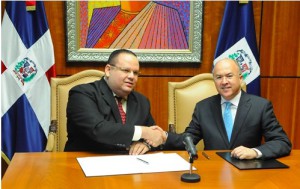. DEMOCRATIC PARTICIPATION .
an article by El Periodico
In order to join efforts to strengthen the system of mediating conflicts and promoting a culture of dialogue in the country, the Attorney General and Justice and Transparency Foundation (FJT) will implement a series of actions for the prevention and resolution of conflicts at the family, school, work and community levels.

click on the photo to enlarge
In this regard a joint cooperation agreement was signed by the Attorney General of the Republic Francisco Dominguez Brito and by FJT president Trajano Vidal Potentini Adames, and as a witness, the CEO of the National Conflict Resolution System of Public Prosecutions ((SINAREC), Angel Gomera.
Attorney General Dominguez Brito expressed his appreciation for the support and the willingness expressed by the Justice and Transparency Foundation to strengthen and expand the concept of reconciliation and conflict resolution as an alternative to the system of justice in cases of conflicts that can be resolved with understanding and respect for the dignity of each of the parties.
“This step contributes greatly to strengthening the justice of reconciliation in the Dominican Republic,” said the Head of Public Prosecutions.
For his part, Trajano Vidal Potentini highlighted the commitment of the authorities of the Attorney General to undertake what he called a new culture that established the Code of Criminal Procedure for the issue of reconciliation, which he described as essential for the development and harmony of the judicial system.
“We are very satisfied to be part of these efforts to establish a culture of peace, even more, of the community and in the neighborhoods to bring the good news that is developing in the direction of alternative dispute resolution,” said the FJT president.
As part of the commitment it was agreed to strengthen and disseminate community models that fit the needs, conditions and criteria for prospective or future centers of mediation, negotiation and conciliation in family, school, work and community order.
Also it was agreed to prepare and present a bill to support the application and development of alternative dispute resolution methods as a public policy to be implemented in the country.
The Public Ministry will ensure the presence of members of this institution trained in the application of the alternative methods of dispute resolution programs that are being developed by the foundation.
The agreement, which was signed at the headquarters of the Public Ministry in the Centro de los Héroes, will be effective for one year.
(Click here for a Spanish version of this article)
Restorative justice, What does it look like in practice?
On this theme, CPNN readers are encouraged to read Restorative Justice for Children in Brazil.